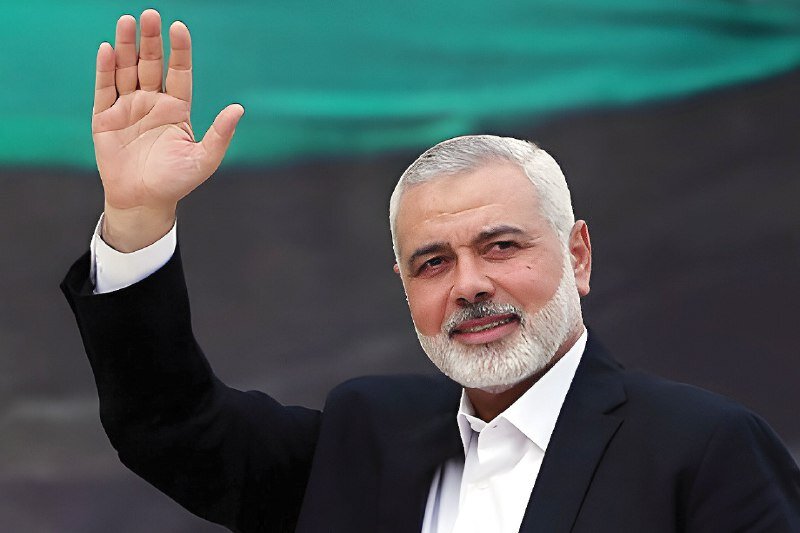Israel's show of desperation
Assasinations in Beirut, Tehran come as regime fails to face off Hamas in embattled Gaza

TEHRAN – The Israeli regime has been targeting top Resistance commanders and leaders in the region since its colossal defeat at the hands of Palestinian fighters on October 7.
Hezbollah’s Taleb Abdallah, Wissam Tawil, Muhammad Nimah Nasser, Mohammad Ahmad Ayoub, and Iran’s Razi Mousavi and Mohammad Reza Zahedi are among the senior commanders the regime has assassinated in the past months. Israel tried to add two more figures to the list on Tuesday and in the early hours of Wednesday: Fouad Shukr, one of the most senior Hezbollah commanders, and Hamas Political Chief Ismail Haniyeh.
Israel conducted attacks in Beirut and Tehran, targeting Shukr in a residential building in the former and Haniyeh in his temporary residence in the latter.
Haniyeh had traveled to Tehran to attend Masoud Pezeshkian’s presidential inauguration ceremony. According to Khalil al-Hayya, the deputy chief of the Hamas political bureau, a missile struck the bedroom of Haniyeh's accommodation, shattering windows and causing damage to the walls. Iranian officials have stated that a full account of the circumstances surrounding the assassination of the Hamas leader will be made public shortly.
Hossein Kanaani, a seasoned West Asia analyst, argues that Israel's legal impunity, granted by Western powers, has allowed the regime to completely and utterly disregard international law and repeatedly breach established red lines. “Netanyahu kills 40,000 Palestinians, injures another 90,000 who are likely to die due to the destruction of all Gaza's hospitals and medical facilities, and then travels to the U.S. and receives standing ovations from members of Congress. How ridiculous is that?” Kanaani told the Tehran Times, adding, “During his address to the U.S. Congress, he explicitly informed American officials of Israel's plans for further terrorist acts and demanded Washington's approval. While Israel's inherently terrorist nature is no secret, the recent two attacks couldn't have occurred without the U.S.'s direct knowledge and assistance. Washington aids the regime in its terror acts and then protects it from reprisals in every international court and organization.”
Back in May, it was revealed that over a dozen U.S. senators have threatened the International Criminal Court (ICC) with American sanctions if the international court moves forward with arrest warrants for senior Israeli officials. Israel has committed various war crimes against civilians in Gaza, including murder, starvation, rape, and torture.
“Israel failing to gain victory on the battleground”
Israel’s military and intelligence circles were completely caught off-guard after Palestinian fighters from the Hamas Resistance group successfully infiltrated the occupied territories on October 7, took control of some settlements for several hours, and took dozens of Israeli hostages to Gaza. In response, Israel launched a full-scale war against Palestinians in the enclave, stating that it plans to continue the war until the full “eradication of Hamas.”
10 months into the war, the entirety of Gaza has been razed to the ground and Israel has turned into a leper around the world. Hamas, however, is nowhere near being defeated.
“Netanyahu is facing growing dissent within Israel as the regime's military struggles to make significant gains against fighters in Gaza. Simultaneously, Hezbollah's relentless attacks since October 8 have left the regime paralyzed in the north,” Mohammad Bayat, an expert on West Asian affairs, said while talking to the Tehran Times.
“With the U.S. presidential elections approaching, the U.S. has been urging Israel to reach a ceasefire agreement with Hamas. However, Netanyahu's demands for a ceasefire, including the ability to resume war against Gaza at will and control over the Philadelphi Corridor bordering Gaza and Egypt, are seen as impossible. These conditions could only have been softened if Netanyahu could point to new achievements in Israel to boast about,” he added, stating the need for an urgent ceasefire is likely the reason Washington consented to the regime's recent assaults in Beirut and Tehran, which have seriously escalated tensions.
How will Resistance respond to Israel’s latest aggressions?
Leader of the Islamic Revolution Ayatollah Seyyed Ali Khamenei has vowed a “harsh response” for the assassination of Haniyeh. “The criminal and terrorist Zionist regime martyred our dear guest in our homeland and left us bereaved, but it also set the ground for a harsh punishment for itself,” the Leader said in a statement released on Wednesday.
The last time Ayatollah Khamenei delivered a warning of this magnitude to Israel was in April, following the regime's assault on Iran's diplomatic premises in Syria. In response, Iran retaliated by launching dozens of drones and missiles from its own soil at the occupied territories, successfully targeting all military bases involved in the embassy attack. Several nations, including the U.S., UK, France, and Jordan, intervened to support Israel and counter the attack, which is thought to have been quite restrained on Iran's part.
Iran’s acting Foreign Minister Ali Baqeri Kani and the country’s permanent mission to the UN have also reiterated Tehran’s right to respond to Israel’s assassination of Hamas’ political chief on Iranian soil, with the mission stating that the response would be in the form of “special operations” which will be “harder and intended to instill deep regret.”
While most pundits are of the mind that a response to Israel's actions is certain, the precise form and execution of that response remain a subject of debate.
“I believe we shouldn't resort to using assassination tactics like the regime does. Instead, we should target Israel in a manner that causes lasting damage, damage that the regime would find extremely difficult to repair. Whatever our response will be, it must far exceed the scale of Operation True Promise,” said Salaheddin Khadiv, a West Asia analyst.
With Hezbollah also vowing to respond to the assassination of its top commander, Israel’s next punishment could come in the form of a multifaceted response, complicating efforts for its Western and regional allies to insulate the regime against Iranian drones and missiles, as they did on April 14.
Leave a Comment